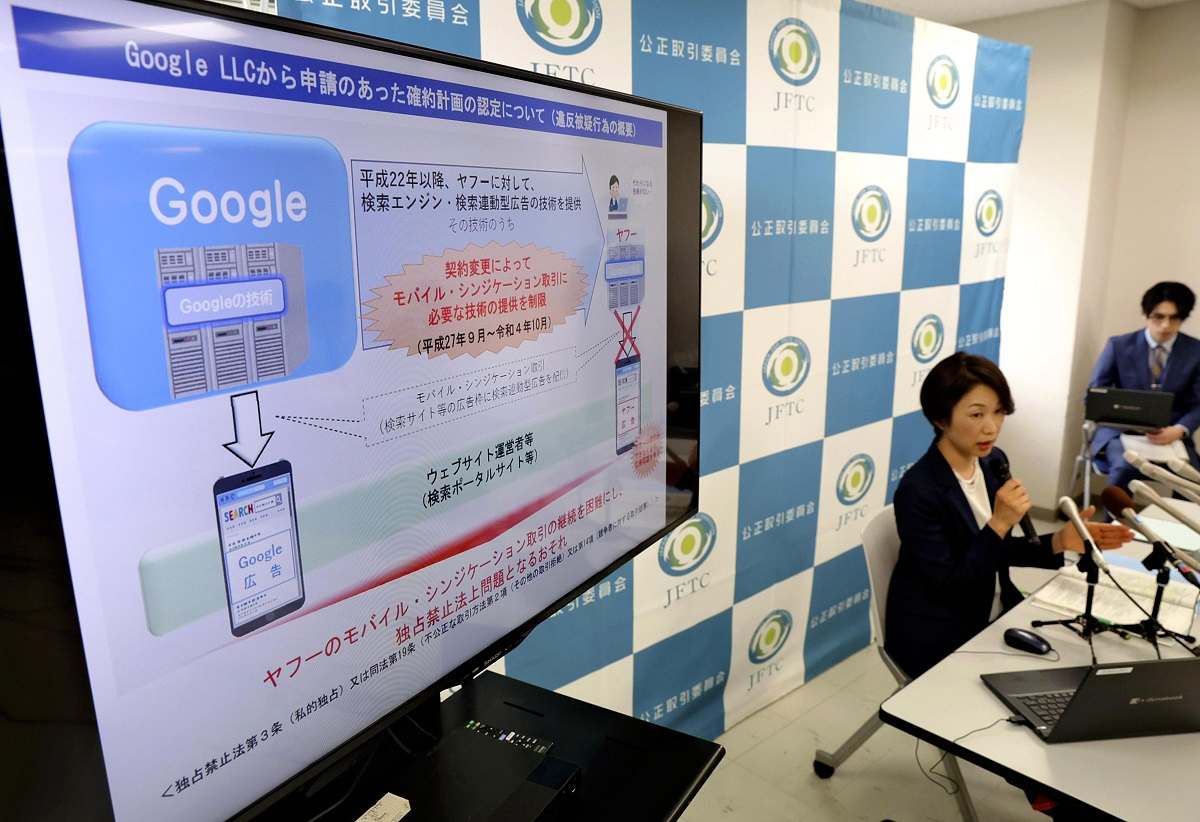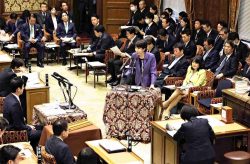Japan’s Fair Trade Commission Seeks to Curb Tech Giants; Lack of Fair Competition Threatens Rivals, Consumers

A Japan Fair Trade Commission official speaks at a press conference about its administrative action against Google LLC on Monday in Chiyoda Ward, Tokyo.
16:36 JST, April 23, 2024
The Japan Fair Trade Commission’s recent administrative action against Google LLC. is part of a global trend to strengthen regulations on technology giants that could distort markets.
The JFTC will continue to monitor Google, the world’s most powerful search engine provider, to prevent the U.S. tech company from engaging in the same conduct again.
Google’s domination
“Yahoo! Japan struggled to keep its business going. Competition was severely restricted,” Saiko Nakajima, JFTC’s senior investigator of digital platform operators, said Monday at a press conference held to announce the administrative action against Google.
Nakajima was describing the problems that stemmed from Google’s violation of the Antimonopoly Law. From September 2015 to October 2022, Google stopped providing Yahoo! Japan, now LY Corp., with technology to display search-linked ads, in which ads linked to the keywords from users’ searches are displayed on websites on smartphones and other devices.
In November 2014, Google changed a technical cooperation contract that it had signed with Yahoo in 2010. Yahoo depended on Google’s technology, so it had no choice but to acquiesce.
In 2023, the market for search-linked ads exceeded ¥1 trillion. Google had a 70% to 80% share, while the rest of the market was believed to be dominated by Yahoo. Services to display ads on smartphones and other devices, whose market value is said to be around ¥10 billion, were effectively dominated by Google, and Yahoo lost business partners and ad revenue for about seven years.
The impact has not been limited to Yahoo. “If ads displayed by Google become expensive due to there being no competition, those cost increases might be reflected in the prices of goods and services, which will be detrimental to consumers. The distortion created by the domination of Google might affect the lives of ordinary consumers,” a senior JFTC official said.
‘Betrayed’
The JFTC began investigating the allegations in the early summer of 2022. Google then resumed providing its technology for Yahoo in November 2022 and competition was seemingly restored. At that time, it was difficult for the JFTC to swiftly issue a cease-and-desist order or an administrative surcharge payment order, both of which require solid evidence.
In past cases in which the JFTC investigated tech giants, the JFTC cancelled the probe if the company concerned improved matters on its own. The commission viewed this as the allegations being addressed.
However, not imposing an administrative action was not an option for the latest Google case, according to the JFTC.
When Google and Yahoo signed their contract in 2010, the JFTC interviewed both companies to see whether the partnership between the two search engine giants might infringe the Antimonopoly Law. Google and others told the JFTC that it would provide technology but conduct business operations on its own, so the commission approved the signing of the contract.
The JFTC later interviewed parties several times, but Google restricted transactions for Yahoo five years later. A JFTC official who knows those days said, “We weren’t informed of the change in the contract at all, and we felt betrayed.”
The JFTC’s action against Google does not recognize a violation of the Antimonopoly Law, but it allows the commission to monitor for three years the implementation status of an improvement plan submitted by Google.
The improvement plan specifies that Google will not restrict the provision of its technologies for Yahoo and also includes the implementation of regular audits — a first — based on the supervision of external experts. If the FTC decides that Google is not complying with the plan, it will be able to resume its investigation. This will also help prevent a recurrence of the misconduct.
Cooperation with other countries
Other countries around the world also have been strengthening regulations on large tech companies. Services provided by these companies have become infrastructure used by many people and increased the convenience of daily life. On the other hand, markets have increasingly become monopolies or oligopolies, which is creating various issues.
From 2017 to 2019, the European Commission, an executive body of the European Union, imposed a huge fine of over ¥1 trillion on Google for its conduct aimed at eliminating competitors. The U.S. authority on competition has sued all the four U.S. tech giants collectively dubbed GAFA since 2020.
The JFTC is currently investigating Google over other allegations that the company pressured smartphone manufacturers to favor its apps. “We’re gathering information in cooperation with overseas authorities. We’ll maintain a strict stance on the dominance of tech giants in the future,” a senior JFTC official said.
Top Articles in Society
-

Producer Behind Pop Group XG Arrested for Cocaine Possession
-

Man Infected with Measles Reportedly Dined at Restaurant in Tokyo Station
-

Man Infected with Measles May Have Come in Contact with Many People in Tokyo, Went to Store, Restaurant Around When Symptoms Emerged
-

Woman with Measles Visited Hospital in Tokyo Multiple Times Before Being Diagnosed with Disease
-

Australian Woman Dies After Mishap on Ski Lift in Nagano Prefecture
JN ACCESS RANKING
-

Producer Behind Pop Group XG Arrested for Cocaine Possession
-

Japan PM Takaichi’s Cabinet Resigns en Masse
-

Man Infected with Measles Reportedly Dined at Restaurant in Tokyo Station
-

Israeli Ambassador to Japan Speaks about Japan’s Role in the Reconstruction of Gaza
-

Videos Plagiarized, Reposted with False Subtitles Claiming ‘Ryukyu Belongs to China’; Anti-China False Information Also Posted in Japan






















